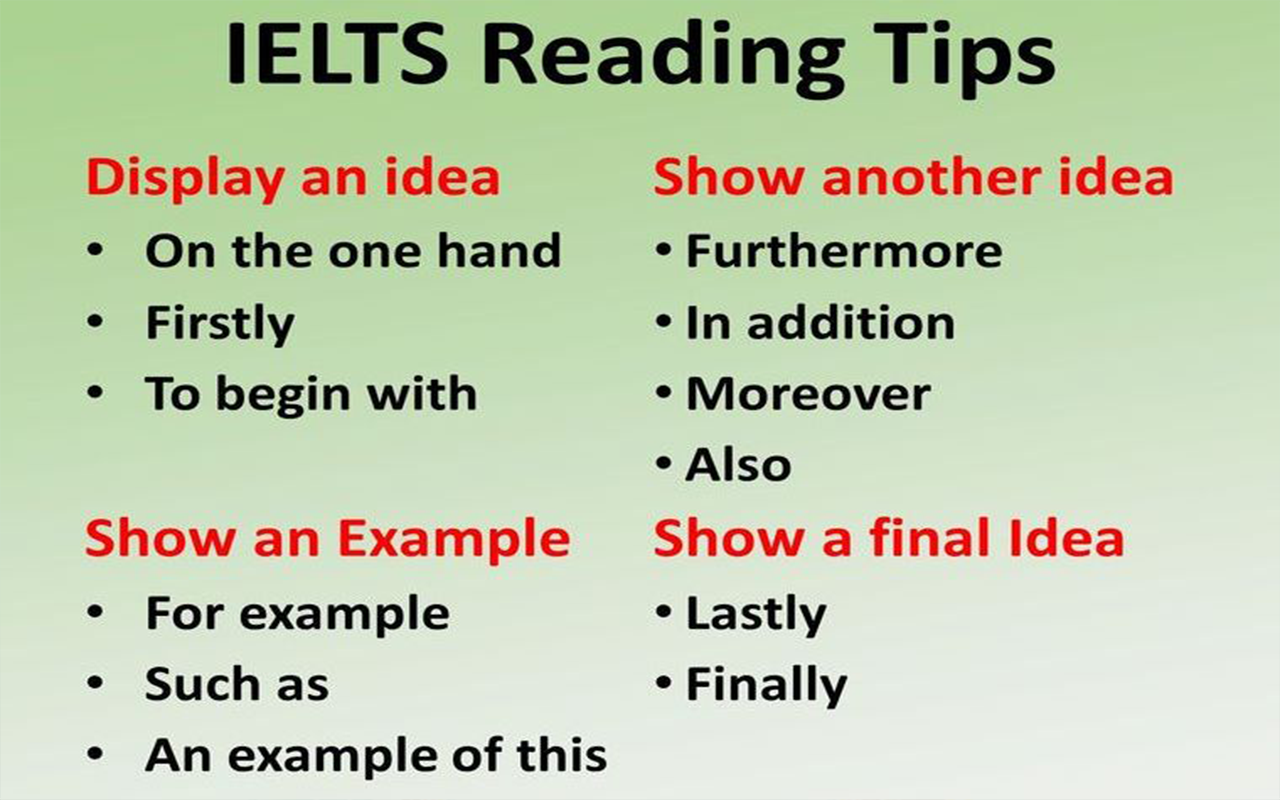IELTS LISTENING TIPS
- Practice Regularly: Consistent practice is key to improving your listening skills. Listen to a variety of English audio materials such as podcasts, news broadcasts, and academic lectures to expose yourself to different accents and topics.
- Familiarize with the Format: Understand the format of the IELTS listening test. There are four sections, and you will hear each recording only once. There will be different types of questions, such as multiple-choice, matching, and completion tasks.
- Focus on Listening Techniques: Develop active listening skills. Pay attention to the main ideas, key details, and any signal words or phrases that indicate important information (e.g., first, next, finally).
- Read Instructions Carefully: Before each section, read the questions and instructions carefully so you know what to listen for. This will help you anticipate the answers.
- Predict Answers: Try to predict possible answers before you hear them. This will help you stay focused during the listening and quickly identify the correct answer
- Note-taking: Take notes while listening. Use abbreviations and symbols to jot down important points quickly. Focus on keywords and phrases that relate to the questions.
- Practice Time Management: During practice tests, get accustomed to managing your time effectively. Remember that you won't have extra time to transfer answers, so write them directly on the answer sheet.
- Practice with Past Papers: Use official IELTS past papers to simulate the test environment. This will help you get familiar with the question types and timing.
- Improve Your Vocabulary: A good range of vocabulary can help you understand various topics and contexts better. Work on expanding your vocabulary through reading and listening to English materials.
- Stay Calm and Focused: On the test day, try to remain calm and focused. If you miss an answer, don't dwell on it and concentrate on the next question.
- Beware of Traps: Be cautious of distractors or traps in the questions. Sometimes, the speaker might say something similar, but the meaning is different from what the question asks for.
- Develop Your Listening Skills Gradually: Don't get discouraged if you find the IELTS listening challenging at first. It's a skill that improves over time with consistent practice.
Have a good ear for accents.
A range of native-speaker accents
- British, Australian, American, New Zealand, Canadian etc. is used in the listening test, so it’s a huge advantage if you are able to understand all of them.
- Train your ears by subscribing to English podcasts and TV news channels. Try listening to Disney World Stories from YouTube which is told by different nationalities.
IELTS READING TIPS
- Time Management: The IELTS Reading test is time-bound, so manage your time wisely. Allocate a specific time for each passage and stick to it to ensure you have enough time for all questions.
- Skim and Scan: Instead of reading every word, quickly skim through the passage to get a general idea of the content. Then, scan the text to find specific information related to the questions.
- Understand Question Types: Familiarize yourself with different question types, such as multiple-choice, True/False/Not Given, matching, and sentence completion. Understand what each question is asking for.
- Read Instructions Carefully: Pay attention to the instructions before each set of questions. Understanding the requirements of each question type is crucial for providing the correct answers.
- Identify Keywords: Look for keywords in the questions and passages. Keywords can guide you to the relevant information and help you find the correct answers more efficiently.
- Guessing: If you are unsure about an answer, make an educated guess. In the IELTS Reading test, there is no penalty for incorrect answers, so it's better to attempt all questions.
- Practice with Authentic Materials: Practice with a variety of IELTS Reading materials, including past papers and authentic texts, to get accustomed to the test format and different types of passages.
- Improve Vocabulary: Enhance your vocabulary to better understand the passages and answer questions effectively. Learn synonyms, antonyms, and context-based word meanings.
- Focus on Scoring Points: Some questions carry more points than others. Prioritize the questions that offer higher scores and allocate time accordingly.
- Stay Calm and Focused: During the test, stay calm and focused on the reading passages. Avoid getting stuck on difficult questions and move on to others. You can always come back later if time permits.
IELTS LISTENING TIPS
- Practice Regularly: Consistent practice with various listening materials, such as sample tests, podcasts, and videos, will improve your listening skills and familiarize you with different accents and speaking styles.
- Focus on Different Question Types: Familiarize yourself with the different question types in the IELTS Listening test, such as multiple-choice, note completion, and sentence completion. Understand the instructions and requirements for each question type.
- Improve Note-Taking: Develop efficient note-taking skills to jot down essential information while listening. Use abbreviations and symbols to save time and capture key points accurately.
- Anticipate Answers: Before hearing the full recording, read the questions quickly and try to predict the answers. This will help you focus on relevant information while listening.
- Pay Attention to Keywords: Listen for keywords and phrases that are likely to appear in the answers. These keywords will guide you to the correct information in the recording.
- Listen for Signposting: Pay attention to signpost words and phrases that indicate important information, such as "firstly," "in addition," or "finally."
- Use Time Wisely: There is no extra time to check your answers in the IELTS Listening test, so ensure you transfer your answers to the answer sheet quickly and accurately.
- Be Prepared for Accents: Practice listening to a variety of accents, as the test may include speakers from different English-speaking regions.
- Stay Calm and Focused: During the test, stay calm and focused on the audio. Don't get distracted by other test-takers or external factors.
- Review Your Answers: After completing each section, quickly review your answers to ensure you have not made any mistakes or missed any questions.



